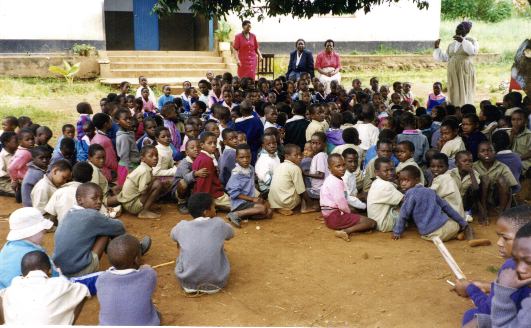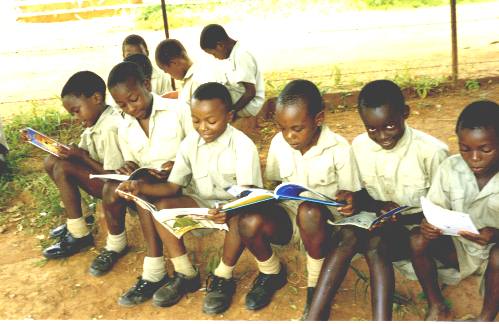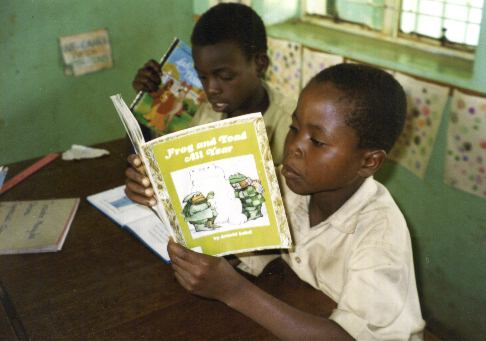It is a beautiful autumn day in Mutare. It is
difficult to associate Easter and the beginning of autumn, but here we are. Easter and the
beginning of new plant life don’t make sense in this situation. The autumnal equinox
has just occurred and the stores are advertising winter clothing (winter means heavy
sweaters and light jackets). The rains have virtually ended, except for an occasional
thundershower, and they won’t come again until next November (early summer). People
are asking us why we aren’t beginning to wear sweaters. We reply that is has finally
cooled down enough to be comfortable. Actually, for us Michiganian types, the sun is still
rather hot, but breezes are plentiful and cooling and it has rarely been hot at night all
the time we’ve been here. Winter (June to August) can bring frosty mornings and the
buildings aren’t heated, but we will be home by then, just in time for another
summer.
One of the never-failing sources of wonderment for Ann is the ever-changing appearance of
the mountains as light and clouds strike or cover various surfaces in different ways. No
matter, in which direction we look or drive from Mutare, vistas of hills and valleys
confront us. Some are jagged, craggy rocks, while others are largely tree-covered. Since
we live in one valley and work in another, we make the twice a day trip up and over
Christmas Pass, complete with ears popping at the swift and significant changes in
elevation. It is a rare day that there isn’t some vehicle stalled on the road
(fortunately 2 laned each way). It may be an enormously heavily laden truck bringing goods
from the Mozambique ports to Harare. It might be one of the scores of worn-out buses
loaded with people with baskets and luggage on top. Maybe just an elderly car or pickup
(where a 10 year-old car is still new) that’s just too tired to make it over the pass
one more time. For us flatlanders, it has been a real treat to sample this scenery with
just short afternoon jaunts in any direction. Easter afternoon we took a 70 kilometer
circular drive that took us over a number of mountains, into a large fertile valley, past
masses of banana and coffee fields, along a dirt road past villages, forestry projects,
etc., and over a couple of mountains back home. More about local animal life in the next
letter.
Ann’s work here continues to bear fruit. Much of that success is due to the active
support of the school staff. They put together an elaborate weeklong reading emphasis
program with posters, poems, storytellers and time out for reading.

Storyteller time at Hartzell School
You can see a FEW of the pictures on the web site our son
has created for us, http://www.taber.net/anm/letters.htm.
In one activity children went out into the community to solicit donations in order to buy
professional books to put in the library for the teachers. The teachers, students, and
community are getting involved and have ownership in this endeavor. The room to be the
library is almost completed. Ann and her two helpers are using April to get it organized
before school starts up again in May. (The schools here have three three-month terms with
a month off in between. April, August and December are school vacation times.) The
headmaster has scheduled the 21st of May for the grand opening celebration ceremonies. It
promises to be a media event. Ann wants you to know that you are all invited and urged to
attend.

Boys reading
Actually, we’d love to introduce some of you who have
made this possible. Some letters of encouragement and congratulations for the effort THEY
are putting into it would be grand, too (Mr. Naboth Maramba, Head Master, Hartzell Primary
School, Old Mutare, Zimbabwe). We have just received word that some thousands more books
are on their way from a book collecting effort by the Hartland, MI elementary schools in
celebration of "March is Reading Month". The thought of processing that many is
giving Ann some doubts and serious anxiety, but she is grateful for the enthusiasm and
sharing spirit of the students and teachers of Hartland.

Reading Frog and Toad
This generosity has proved to be typical in a way that surprised us from the beginning and
is continuing to astound us. After our last letter, an already generous supporter wrote,
asking about tuition fees. As a result, he has given enough money so that 100 more primary
age kids will be able to attend school next term! They haven’t been in school because
many families that get work only a few months a year on neighboring farms simply
can’t afford the miniscule (to us) fees needed to give their children the most basic
education. A bright elementary student, the daughter of the mission groundskeeper, will
attend Hartzell secondary school, and a full time clerk (one of her present helpers) will
staff the library when Ann leaves. These are currently commitments for one year, but who
knows what the future may bring? We continue to marvel at the generosity our involvement
has unleashed.
We have become more personally aware of the immensity of problems facing Africa. You may
recall our mention of people attending an AU seminar on Disaster and Emergency Relief at
our hotel. They have now returned to their frontline tasks in places like the Sudan,
Nigeria, Uganda, Congo, and Rwanda. One of them is already dead; killed by a spray of
gunfire while she was eating near the Kenya-Somalia border. Two pastors--theology students
at AU--were trapped for a number of weeks at Christmas by fighting in their home country,
Sierra Leone. One pastor shared her experience of seeing rebels hacking off arms and legs
and of how she and her grandchildren had to defy orders to stay inside or be shot in order
to hike for a day across Freetown through the lines to get to the airport. The family of
one of the lecturers at AU is still trapped there. Rather than our tendency to affix
labels of backwardness, however, we should keep these horrific events in perspective,
remembering the sufferings and tragedies inflicted every day on so many people in our
"more civilized" U.S. Our Vice-Chancellor’s closing remarks spoke of hope
for the time when disaster response will be needed only for natural ones, not man-made
ones. Amen!
One of the high points of our week is Wednesday morning chapel at AU. The music is
spectacular as the university choir sings at least two numbers each time, often singing
compositions by the director, Patrick Matsinkenyiri. (His musical talents were also very
evident at his son’s wedding last Saturday.) The choir will take its annual American
tour to Boston and the East as soon as exams are over in May. The speakers are varied,
with visitors from various countries interspersed with resident members of the faculty.
Quite regularly, recognition is given to donors’ support for AU, representing funds
for the newest dormitory block or a 1562 edition of a Martin Luther Bible as one of the
initial items for the continental archives to be located in the new library now under
construction. The university is certainly not thinking small in its ambition to be a star
in southern Africa’s educational firmament.
Africa University’s semester is nearing an end, far too soon for Morris. April 30 is
the last day for instruction, followed by two full weeks of exams. Exams are three-hour
marathons and count for 60% of the final grade. Faculty members turn in their questions
and instructions and then "invigilate" (proctor) other instructor’s exams
(in teams). Most of Morris’ students missed 2 classes last week (one of the days a
test was scheduled) because of a "strike" called by the student government to
protest the possible raising of tuition fees. He’s feeling very frustrated because he
has had so little time with his students. Most of the students would have just as soon
come to classes, but felt intimidated by the activists. The Dean (and leading history
teacher) of Humanities and Social Sciences has now returned from a life-threatening
illness and therefore the scheduling and planning of the history curriculum should run
much smoother in the semesters to come, but this one has been quite chaotic by any
standards. Growing pains can be expected for a new international university with a wide
variety of backgrounds and expectations, and Africa University has them. The nosedive of
the Zimbabwean economy and currency has made it doubly difficult. With faith, hard work
and continuing support it will succeed. It has to! Too many futures are at stake!
When we hear of newly arrived neighbors just the south of us working in a rural hospital
with no electricity and precious little medicine or equipment, we are again reminded of
how comfortably off we are even here compared with most of the world. Last letter’s
closing line is still appropo. "Life here is challenging, sometimes frustrating and
occasionally depressing, but always rewarding, and never gets boring."
Grace and Peace, Ann and Morris


